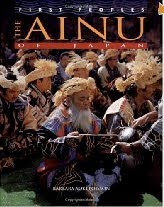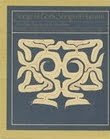
The Owl and the Message is my English version of the Song Sung by the Owl God~ Konkuwa from Chiri Yukie's yukar anthology. I translated and retold it in view of getting it published as a storybook for English-speaking children. The message to which my title refers, is a timely one for our day. In the story, the Ainu villagers are starving because the mountains and rivers no longer provide the food they need. The owl kamuy, who is the guardian of the village, sends a message to the land of the kamuy gods to find out why this situation has come about. He receives a reply with an explanation, a warning, and a chance for the village to redeem itself. I find it easy to imagine this yukar being chanted to generation after generation of young Ainu, as a lesson in both personal and group responsibility, the consequences of one's behavior, and how to co-exist with nature.
The Owl and the Message
When I was young my voice was strong. Now I am old and my voice has become weak. But I have an important message and I need someone I can count on to deliver it for me. So I called out, “Is there anyone who is good at speaking and can be trusted to deliver my message?”
A young crow came to my door and said, “No one is better at speaking than I am. You can count on me to deliver your message.” So I began to tell him the message as I beat on the lid of the wine cask, for my message was a long one. Three days passed and I was still only part way through the message. But I looked up and saw that the young crow had fallen asleep next to the hearth. I became very angry and beat the crow to death.
Once again I called out, “Is there anyone who is good at speaking and can be trusted to deliver my message?” A mountain jay came to my door and said, “No one is better at speaking than I am. You can count on me to deliver your message.” So I began to tell him the message as I beat on the lid of the wine cask, for my message was a long one. Four days passed and I was still only part way through the message. But I looked up and saw that the mountain jay had fallen asleep next to the hearth. I became very very angry and beat the mountain jay to death.
Once again I called out, “Is there anyone who is good at speaking and can be trusted to deliver my message?” A young water ouzel came to my door and respectfully entered my house. I saw that he was well-dressed and had good manners. So I began to tell him the message as I beat on the lid of the wine cask, for my message was a long one.
After six days and nights I looked up and saw that the water ouzel was wide awake and still listening carefully to my words. As soon as I finished speaking, the water ouzel flew out of the house through the smoke hole in the roof and took my message up to heaven.
This was my message:
“There is a famine in the human world and the humans are starving. There is nothing to eat on land or in the water. When they hunt in the hills, there are no deer. When they go to the river, there are no fish. Is there a reason the gods will not provide for their needs?”
After several days passed, the water ouzel returned to my house with an answer from heaven. The water ouzel said, “Humans have been treating the deer and fish without respect, hitting them with rotten sticks and leaving parts abandoned in the forest. The spirits of the deer and fish return to heaven in a mess, and this has made the gods angry. But if humans improve their ways by showing respect to wildlife, and once again treat the deer and fish with honor, the gods will make sure they will have enough to eat.”
That night I went to the humans in their dreams and explained to them the reason for the famine. I then taught them how to treat the deer and fish with honor. The humans changed their ways from the very next day. They began to treat wildlife with respect. They used beautifully carved sticks for fishing and hunting, and they adorned the deer and fish after catching them, so that their spirits could return to heaven in honor.
The gods now provide the humans with enough to eat, and there is no fear that they will starve any more. The crisis is over and my spirit is free to leave this old body at last. I will now go to heaven, leaving the human world in the care of younger owl guardians.
The End
I'm not sure whether I should stick to the relatively formal language of the original yukar, or if I should revise it to sound more modern and informal. I also wonder how Western readers will react to what happens to the crow and the mountain jay. Will I have to soften the language? Or should I be true to the original? If you have any thoughts on these issues, I welcome comments. The attached illustration is the work of Stephanie Gagnepain.










